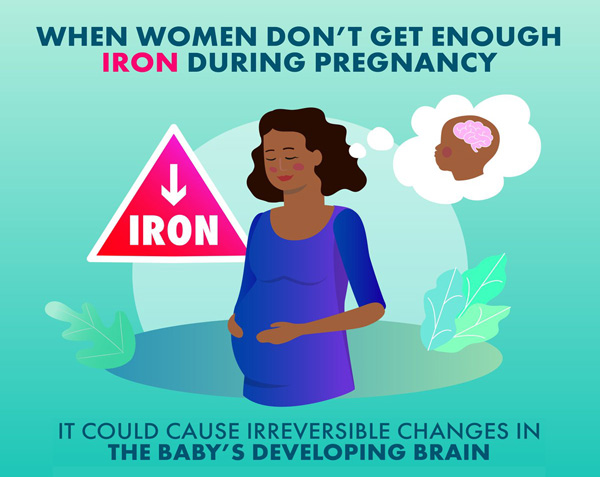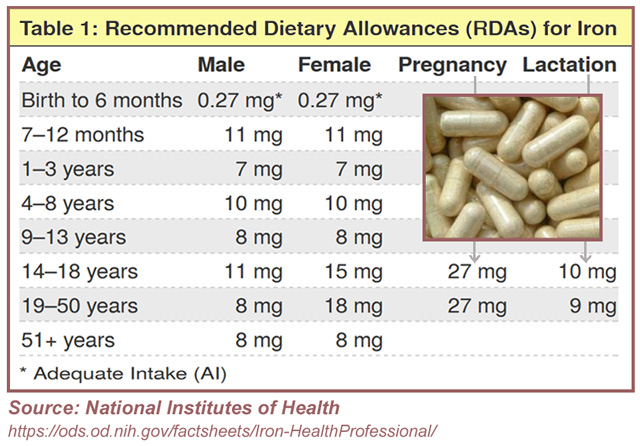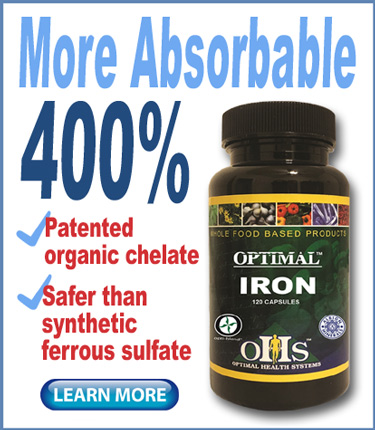In a world of flashy weight loss and muscle-building supplements, many consumers forget the basic vitamins and minerals.
This is often to their own detriment as one study after another finds that almost everyone is deficient in one or more of the basic critical nutrients
Consistent with this a new University of Toronto study found half of pregnant women who had a simple blood test to check their iron stores had low iron levels—and one in four had severe iron deficiency.
The research, which included a large regional review of more than 40,000 pregnant women, was published in Blood Advances in August 2021.
Iron knowledge is lacking
The study also found that 40% of women never even had their iron level checked while they were pregnant—a disturbing discovery since iron is critical to both mother and child during pregnancy.
Researchers said the findings underscore the need to revisit clinical guidelines to ensure that ferritin testing, the standard measure of iron deficiency, is included as a routine part of maternal care and pregnancy health screenings.
“Despite the very high prevalence of iron deficiency in pregnancy, and how easy it is to treat, we are not doing a very good job of checking for it,” said lead study author Jennifer Teichman, MD, of the University of Toronto, Canada and its affiliated hospitals including St. Michael’s Hospital/Unity Health Toronto, where the study was conducted. “It’s not top of mind, in part, because of inconsistent recommendations for ferritin testing across clinical guidelines.”
Notwithstanding the call for healthcare providers to conduct more testing, the study also underscores the failure on the part of individuals to take charge of their own health.
Iron deficiency is just one more example of a woefully uninformed populace that undervalues the importance of supplementing basic vitamins and minerals.
While not everyone can be a nutritional expert, basic information on vitamins and minerals is readily available.
Most of the blame for this lack of knowledge lies squarely at the feet of mainstream media.
Since much of their funding comes from pharmaceutical companies, they are eager to publish claims of the worthlessness of taking supplements while ignoring the mounting evidence to the contrary.
One such example is the supplement hit piece, “Experts Say Don’t Waste Your Money on Multivitamins“ which was published by HealthDay News in 2013 and is still being widely circulated on the Internet.
Study details
The study reviewed the data of 44,552 pregnant women who received prenatal testing at community laboratories in Ontario, Canada, between 2013 and 2018. First, the researchers sought to determine how often ferritin testing was offered.
Secondly, researchers sought to provide more robust data about the prevalence and severity of iron deficiency among pregnant women.
Results showed that 60% of patients received a ferritin test during pregnancy; 40% did not. Most tests were ordered by general practitioners (48%) and obstetricians/gynecologists (32%).
The vast majority of ferritin testing (71%) occurred at or around the time of the first prenatal visit, when the risk of iron deficiency is lowest. Unfortunately, this is the only time many of the patients’ iron levels were checked during their pregnancy.
“Iron deficiency is very common, and there can be poor outcomes for both mom and baby if it isn’t identified and treated,” said Dr. Teichman. “The good news is that it’s easily found with a simple blood test and completely correctable with iron supplements.”
ttUnfortunately a common misconception by consumers is that all iron supplements are dangerous.
This is due to fact that overuse of synthetic types of iron, such as ferrous sulfate, can cause serious side effects in large doses—and even in low doses can cause digestive discomfort.
However, some iron supplements, such as Optimal Iron from Optimal Health Systems, contain organic chelated sources of iron which are much safer than synthetic iron supplements. They are also better absorbed on the cellular level.
The patented form of iron used in Optimal Iron is known as Ferrochel®. It has been proven to assimilate up to 400% better than other forms of iron. Learn more here.
– – –
Article sources: Blood Advances / AshPublications.org, American Society of Hematology.



